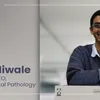This Ahmedabad-based startup is developing non-invasive device for diagnosing brain injuries
Founded in 2013, Bioscan Research has developed a point-of-care screening device to screen patients for any intracranial haemorrhage.
Traumatic brain injuries are considered to be one of the leading causes of morbidity and disability. According to reports, nearly 1.5 to 2 million people suffer from traumatic brain injuries and almost one million lose their life to the condition in India every year. Road accidents, falls, and violence are considered to be the leading causes of brain injuries.
However, brain injuries might get diagnosed late in case of late or unclear symptoms, which can further deteriorate the condition.
Ahmedabad-based is looking to solve this problem through its non-invasive diagnostic device, which can screen and detect intracranial haemorrhage, i.e. bleeding inside one’s skull.

Image Credit: Bioscan Research
Founded in 2013 by Shilpa Malik and Anupam Lavania, Bioscan has developed miniaturised diagnostic hardware called Cerebo, a point-of-care screening device, to screen patients for any intracranial haemorrhage. In case the device alerts positive, the patient can be immediately tested to understand the damage and begin the treatment.
Speaking to YourStory, Shilpa explains that while CT scanners are available for diagnosing the condition, they cannot be used for mass screening due to their large size. Apart from this, the medical staff also needs to follow certain protocols to screen the patient using these scanners as there will be radiation exposure.
“For example, in case a trauma patient comes in and they have no symptoms, doctors will not be able to do CT or MRI scans at that moment as they need to follow a protocol. But sometimes, even if a person has a mild injury or a jolt to the head, even that might cause damage if not checked early. Our device acts as a bridge and can screen the patient immediately to confirm in case of any brain injuries,” she explains.
In 2019, Bioscan Research won a special prize from C-CAMP during the National Bio Entrepreneurship Competition (NBEC).

Illustration: YS Design
Detecting intracranial haemorrhage
Ahmedabad-based Bioscan’s Cerebo is a portable point-of-care device that can be used by medical practitioners and paramedics to do the first screening and confirm if the patient is required to be scanned with the traditional machines.
As it is a non-invasive screening device, patients who may have suffered an injury can be immediately screened even if they do not show any symptoms, but the same cannot be done with MRIs or CT scans.
“Our device is positioned very differently from MRI or CT scans. MRI and CT needs to diagnose very clearly so as to guide the doctors in treating the patient. Meanwhile, our device is a screening device. For example, in case a person has met with an accident, they might take time to develop symptoms, and then they visit a hospital and begin their treatment process. In case the person has an injury, the longer time might worsen the condition.”
“But here, if one has met with an accident or something which might have hurt their head, even if they do not experience any symptoms, they can still get themselves prescreened. If the device finds any anomaly, the report can be then shared with doctors using which they can prioritise scans and treatments,” Shilpa says.
The co-founder explains the device is very easy to use and requires very minimal training. It is a portable device with inbuilt sensors and is battery operated.
“The testing can be done in three simple steps. Once the device is switched on, the medical worker will be asked to add patient details using a button and the location where they are scanning. Post this, they need to point the device on the patient's head and the scan will automatically start and stop. The medical staff will then need to press on the result button and the result of the diagnostic will appear. The device will flash a green light if there is no haemorrhage, and a red light in case the patient is suffering from a haemorrhage. This result can then be used to prioritise CT or MRI scans immediately,” she explains.

Image Credit: Bioscan Research
The device will also generate a detailed report, which can be downloaded from Cerebo Cloud onto the computer and one can share the detailed analysis of the condition with the doctor.
Shilpa reveals the device is also very helpful in rural regions where MRI or scanning devices might not be available. Using this device, local medical staff can screen the patients and immediately refer them to bigger hospitals in case of any anomalies detected.
Business and more
Speaking about the business plan, Shilpa reveals the startup charges a one-time fee for selling the device. Apart from this, client health institutes will also need to regularly purchase an eco-friendly disposable component that needs to be placed on the device while screening the patient. The device will be in touch with the patient’s head during the screening, thus the disposable component will need to be attached to avoid infections and maintain hygiene. It will need to be changed before screening every patient.
Currently, Bioscan has deployed two machines and has 30 deployments in its pipeline.
“We are looking at deploying 100 devices in India by March 2021. We are also looking to build the next updated version of Cerebo and are in talks with doctors for the same. Once we have had deployed about 50 devices, we will also start looking to raise funds,” she says.
According to a report by IBEF, India’s medical devices market stood at $11 billion in 2020 and is expected to reach $65 billion in 2024. India had been relying on the import of medical devices for a long time, but now, especially amid the COVID-19 outbreak, innovators are working to ensure that India becomes self-reliant in the healthcare segment.
Startups such as EzeRx, Waterchips, and Janitri Innovations are also building point-of-care diagnostic solutions to disrupt the medtech sector in India.
YourStory’s flagship startup-tech and leadership conference will return virtually for its 13th edition on October 25-30, 2021. Sign up for updates on TechSparks or to express your interest in partnerships and speaker opportunities here.
For more on TechSparks 2021, click here.
Edited by Megha Reddy









